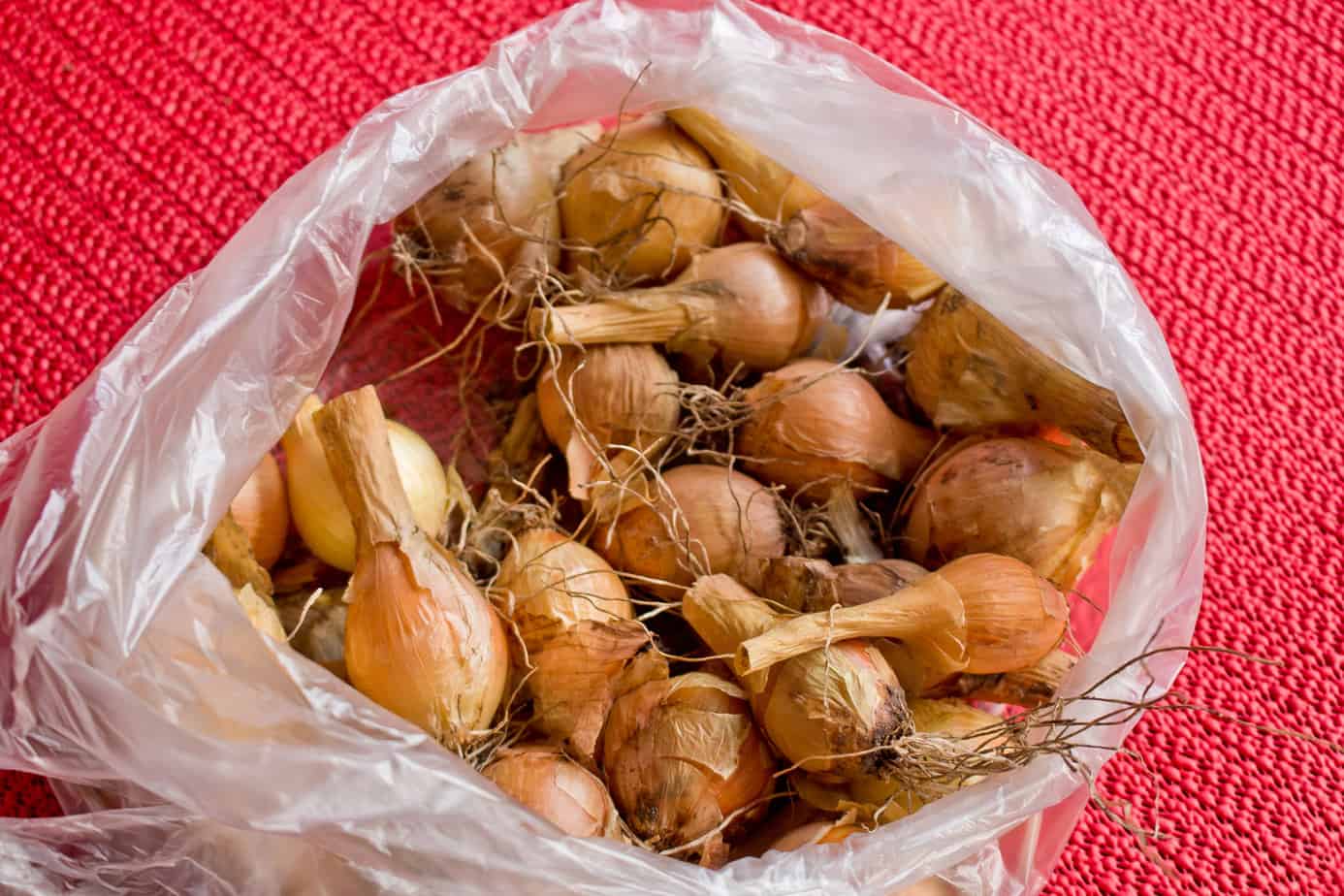Are you worried about your onions getting small? (no, not those ones, the ones growing in your garden!!) Nothing is more annoying than taking the best care of your onion and getting only small-sized onions. Understanding the cause of this problem and finding a solution is important.
So let’s discuss more on this problem and what you can do about it.
Why Are My Onions So Small?
The number of leaves produced by the onions before the days shorten impacts the growth of the onion. As a result, the sooner you put the plants, the bigger your onions will become. Growing an onion species that is not suitable for your environment can lead to smaller onions.
How Do I Get My Onions To Grow Bigger?
When farming onions, getting small onions is a significant concern; this might damage your entire production, which will affect your earnings.
Select the Appropriate Variety
Onion cultivars are classified into intermediate-day, short-day, and long-day onions. Long-day onion varieties thrive in areas where summer days are long, giving onions ample time to produce numerous leaves until bulb production begins.
Timely Planting
When onions are planted too late, they frequently produce very few bulbs. If you plan to raise onions from seed, plant them indoors in late winter/early spring to offer them a head start.
Thin plants
When onions fight for sunshine, moisture, and minerals, they frequently fail to develop many leaves as plants require to develop huge bulbs.
Weed Control
Onions have weak tubers, making them weak rivals against adjacent weeds. Mulch the soil beneath onions with a thick coating of dried leaves, crushed leaves, or cleaned hay to keep weeds at bay.
Fertilize and water
Because of their shallow roots, shallots dry up sooner than other crops. They require constant watering and fertilizers during the growing season to the
Why Are My Onions Not Growing?
Onions are a winter-season product that takes three months or more to mature. Because of the extended growing season needed and their preference for cooler conditions, sowing onion seeds immediately into the garden in the springtime makes it hard for the bulbs to reach a large size before the arrival of hot conditions.
Can I Eat My Small Onions?
The answer to that is yes! The onions and garlic may get squishy after sprouting, but they are neither dangerous nor harmful and will not hurt you. They are still excellent, even though the roots and branches are still small. Many individuals consume sprouts on purpose because they provide higher protein. So you can eat small onions without any concerns.
How Long Does It Take For An Onion To Grow To Full Size?
Onions prefer cold conditions. Depending on the kind, they take between 90 and 120 days to mature. If your developing season is brief in your location, it may be hard for onions produced from seeds to mature before the warm weather arrives. You may pick the bulbs when they are large, and the tops have turned yellow.
Why Won’t My Onions Get Bigger?
When onions fight for sunshine, water, and nutrients, they frequently fail to develop as many leaves as they require to grow huge bulbs. Because each onion leaf corresponds to a ring on a bulb, a higher number of big, healthy leaves equals larger onions. It is why your onions aren’t growing bigger and healthier.
How Can I Grow My Onions?
Once the soil is usable, grow onions in early spring. Planting onions in the ground beds and garden beds are both wonderful alternatives. Onion plants should be spaced six inches distant in lines 12 inches wide. Plant them in a sunny location with healthy, well-drained soil with an acidity of 6.0 to 6.8.
What Are The Tips For Growing Big Onions?
Use the following tips for growing big onions in your garden,
- Plant the appropriate onion variety for your locality. – There are three sorts of onions; the best one to use is where you reside. Long-day, short-day, and intermediate-day onions are among the varieties.
- Plant at the appropriate time – Growing onions at the proper time are crucial to growing onions properly. The optimal time to grow onions in most places is 4-6 weeks before the latest freeze date.
- Water well after fertilization – It would help if you watered the onions well after fertilization so that they will get mixed with the soil well.
- Don’t overwater – Yellow-tinged leaves indicate overwatering, so regulate watering if it shows yellow.
- Plant in direct sunlight – Plant onions in places that get a lot of sunlight for about six to eight hours.
What Is The Secret To Big Homegrown Onions?
Onions thrive in regular rainfall but perish if the soil becomes too damp. It is critical that your water supply distributes water evenly, ideally to 1 to 2 inches a week until bulbing and then 3 to 4 inches a week throughout bulbing. These are some of the secrets of big homegrown onions that you can try.
How Do Plant Onions Get Big Bulbs?
As previously said, onions require the maximum hours of sunlight to produce large bulbs. Allow 3-4 inches of spacing between onion bulbs. Weeds that fight for sunlight and water should be removed. Ensure adequate moisture, especially during bulb development — onions do not appear to require water.
What Is The Best Fertilizer For Growing Large Onions?
Onions take a lot of nitrogen, so nitrogen-based fertilizers like ammonium sulphate should be given every twenty days. Fertilizers can be given three weeks after seeding, and further sessions should be made every two to three weeks. Add no more fertilizer until the neck begins to feel mushy.
What Are Some Easy Steps To Grow Large Onions?
To grow large crops easily, follow these steps,
Step 1: Get the Seeds Ready
Step 2: Clear a Space for the Plant and Prepare the Soil
Step 3: Keep a Close Eye on the Tray
Step 3: Keep a Close Eye on the Container
Step 5: The plant will be ready for harvest in four to five months.
Step 6: After harvesting, stack the onions with the leaves.
How Long Does It Take To Grow Large Onions?
Onions are a long-growing crop that takes 100-120 days from planting to extract a full bulb. Harvesting time from transplants or sets is 60-80 days. As a result, developing large onions will take some time. You should provide the plant with the necessary minerals, water, and sunlight during this time.
FAQ
Are Small Onions Good To Eat?
The answer to that is yes! The onions and garlic may get squishy after sprouting, but they are neither dangerous nor harmful and will not hurt you.
How Often Should You Water Onions?
It would help if you watered onions once a week. This is better than water daily as we can prevent the soil from getting soggy which could cause diseases.
How To Plant Onions In The Home Garden?
Onions must be grown in cold climates. Plant the onions 2 to 6 inches apart and gently push them into 1 inch of loose soil.
How Do You Take Care Of An Onion?
It is very easy to take care of onions. You just need to provide them with adequate water, fertilizer, sunshine, and weed control.
Do Onions Need Lots Of Water?
Yes, but no overwatering, onion plants require appropriate water to generate excellent yields. You should provide them with adequate water once a week.
Conclusion
Onions don’t grow in full size or large due to a variety of reasons. This can be avoided with the proper understanding of what causes this problem and understanding the solutions for it. Taking care of onions and providing them with the necessary inputs can be really helpful.


